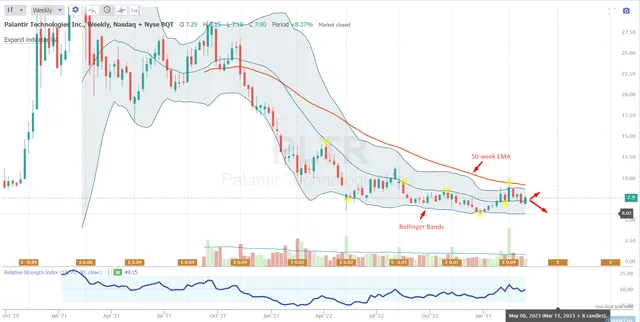Have you ever wondered how some companies seem to zoom to the top while others struggle to keep up? One such company is Palantir Technologies, which has become super popular in the world of artificial intelligence (AI). As we dive into 2025, many people are asking: is Palantir just a bubble waiting to burst? With AI being predicted to add a staggering $15.7 trillion to the global economy by 2030, understanding whether Palantir can keep its momentum is crucial. Let’s explore the exciting world of AI, Palantir’s powerful tools, and what history tells us about its future!
| Key Information | |
|---|---|
| Company Name: Palantir Technologies | Market Cap: $231 Billion |
| Current Price: $101.36 (as of Feb 5, 2025) | Today’s Change: -2.38% (-$2.47) |
| AI Impact on Economy | Estimated Boost: $15.7 Trillion by 2030 |
| Business Segments | Gotham (Government) & Foundry (Commercial) |
| Fourth-Quarter Sales | $827.5 Million (36% YoY Growth) |
| 2025 Sales Guidance | $3.741B to $3.757B |
| Price-to-Sales (P/S) Ratio | 83 (Very High) |
| Concerns | Potential AI Bubble & High Valuation Risks |
| Stock-Based Compensation (SBC) | $691.6 Million in 2024 |
Understanding Palantir Technologies and Its Value
Palantir Technologies is often discussed in the context of artificial intelligence (AI) and its impact on the economy. The company has developed two main platforms: Gotham and Foundry. Gotham is used primarily by governments and military organizations to collect and analyze data, while Foundry helps businesses manage their information more effectively. This unique combination of services makes Palantir a significant player in the AI market, leading many to see it as a valuable investment opportunity.
Despite its advantages, Palantir’s high valuation raises questions among investors. At a market cap of around $231 billion, it has an enormous price-to-sales (P/S) ratio of 83, which indicates that its stock might be overvalued compared to its actual sales. Investors often fear that such high valuations can lead to a stock market bubble, where prices are driven up beyond what companies are truly worth. This history of bubbles makes cautious investors think twice before diving in.
The Risks of Investing in Bubble Stocks
Investing in bubble stocks like Palantir can be risky. Historically, many companies that have enjoyed rapid growth due to innovations, such as the internet or AI, have faced significant downturns after their stock prices soared. When investors realize that the company’s worth is not as high as they thought, the stock prices can drop sharply. This has led to concerns that Palantir may not sustain its current growth trajectory, which could put investors at risk of losing money.
Moreover, Palantir’s reliance on government contracts provides some stability, but it also means that any changes in government policy or funding can impact its business. The company’s ability to continue growing at its current pace is uncertain, especially in a market that can change rapidly. Investors should always consider these risks and look at the broader market trends before making decisions, especially with stocks that might be in a bubble.
The Future of AI and Palantir Technologies
As artificial intelligence continues to grow, many experts predict it will add trillions to the global economy by 2030. Palantir is well-positioned to benefit from this trend due to its strong technology and unique services. However, the company faces challenges that could impact its future success, such as potential competition and market saturation. Investors should keep an eye on these factors as they could influence Palantir’s growth and stock performance in the coming years.
Despite the challenges, Palantir’s growth in the Foundry platform shows promise, especially as more businesses seek to harness AI for efficiency. The growing number of commercial clients indicates that there is demand for their services. Yet, investors must remain cautious, as the market can be unpredictable. Understanding the balance between Palantir’s potential and the risks involved is crucial for anyone considering investing in this company.
Understanding Palantir’s Competitive Landscape
Palantir Technologies operates in a highly competitive landscape, particularly within the realms of artificial intelligence and data analytics. The company’s unique dual-platform offering—Gotham for government contracts and Foundry for commercial applications—sets it apart. However, this competitive edge can be overshadowed by emerging technologies and rival firms that are increasingly entering the AI space. Companies like Snowflake and Databricks are gaining traction, which may challenge Palantir’s market share and ability to sustain its premium valuation.
Moreover, the rapid advancements in AI technology mean that Palantir must continuously innovate to stay relevant. As businesses increasingly seek more cost-effective and efficient solutions, the pressure mounts on Palantir to justify its high price-to-sales ratio. If competitors can provide similar services at lower costs or with more versatility, it could significantly impact Palantir’s revenue growth and market position, raising questions about whether it can maintain its current valuation amidst this evolving landscape.
The Risks of Overvaluation in AI Stocks
Overvaluation is a significant concern for investors eyeing Palantir Technologies, especially given its staggering price-to-sales ratio of 83. Historical trends indicate that companies with inflated valuations are often more vulnerable during market corrections. If the anticipated AI bubble bursts, it is likely that stocks like Palantir will experience severe declines, similar to what occurred during the dot-com bubble. Investors should remain cautious as a correction could lead to substantial losses for those who do not heed historical warnings.
Additionally, the allure of AI has led many investors to overlook fundamental financial metrics in favor of hype. Palantir’s reliance on government contracts provides some financial stability, but the bulk of its valuation is still tied to market sentiment rather than solid earnings. This disconnect can create a precarious environment where even slight shifts in investor confidence could lead to sharp sell-offs. Therefore, understanding the risks associated with overvaluation is crucial for anyone considering investing in Palantir.
The Future of AI and Its Impact on Stock Valuations
As artificial intelligence continues to transform industries, its impact on stock valuations cannot be overstated. While AI is projected to contribute significantly to global GDP, the market often reacts unpredictably to technological advancements. Investors must recognize that while Palantir might currently be perceived as a leader in AI solutions, the volatility associated with tech stocks means valuations can fluctuate wildly based on market sentiment and speculative trading, rather than company performance alone.
Moreover, the future of AI regulation could also influence Palantir’s market position. As governments around the world begin to establish stricter guidelines around data usage and AI ethics, companies like Palantir may face new compliance costs and operational challenges. This regulatory landscape could further complicate the company’s ability to justify its high valuation, especially if competitors adapt more swiftly to new regulations, thereby eroding Palantir’s perceived competitive advantages in the marketplace.
Analyzing Palantir’s Financial Health and Profitability
A deep dive into Palantir’s financial health reveals both strengths and potential weaknesses. The company’s ability to secure long-term government contracts provides a steady revenue stream, but it is crucial to assess whether this model can sustain profitability in the long run. As the company invests heavily in research and development to maintain its competitive edge, analysts must scrutinize how these expenditures impact overall profitability and whether they justify the current market cap.
Additionally, the rising trend of stock-based compensation (SBC) poses a risk to Palantir’s financial stability. With SBC increasing at a pace that outstrips net income, there’s a growing concern about shareholder dilution and its effect on earnings per share. Investors should closely monitor these financial metrics as they can have significant implications on Palantir’s valuation, especially in a market where investor confidence can be easily swayed by short-term performance indicators.
Frequently Asked Questions
What does Palantir Technologies do?
Palantir Technologies creates **software** that helps organizations analyze and understand data. They have two main products: **Gotham** for governments and **Foundry** for businesses, both powered by **artificial intelligence (AI)**.
Why is Palantir considered a big stock in the AI world?
Palantir is seen as a major player because it has strong **competitive advantages**. Its software helps its customers make better decisions using data, which is very important in today’s tech-driven world.
What is a stock bubble and why is it important for Palantir?
A **stock bubble** happens when a company’s stock price rises too high too quickly. This is important for Palantir because if the bubble bursts, its stock price could drop significantly, affecting investors.
How much money could AI add to the world economy by 2030?
AI is expected to boost the global economy by a huge amount—**$15.7 trillion**—by 2030. This means AI technology, like what Palantir uses, could create a lot of new jobs and opportunities.
What are the two parts of Palantir’s business model?
Palantir has two main parts: **Gotham**, which helps governments with data, and **Foundry**, which helps businesses analyze their data. Together, they support different sectors with their unique software solutions.
What is the price-to-sales (P/S) ratio and why does it matter?
The **price-to-sales (P/S) ratio** shows how much investors are willing to pay for each dollar of sales a company makes. A high P/S ratio, like Palantir’s 83, might mean the stock is overvalued.
Should I invest in Palantir Technologies right now?
Before investing in Palantir, think carefully. Some experts suggest looking at other stocks that might perform better, especially since Palantir’s stock is considered risky.
Summary
The content examines Palantir Technologies as a potential bubble stock in 2025, highlighting its significant market cap of $231 billion and its role as a leader in the AI sector. While the company boasts unique competitive advantages through its Gotham and Foundry platforms, concerns arise from its high price-to-sales ratio and the historical tendency for tech stocks to undergo bubble-bursting corrections. Although Palantir has demonstrated strong revenue growth, its reliance on interest income and increasing stock-based compensation pose risks to its valuation sustainability. Overall, the analysis suggests caution for potential investors amid these concerns.








